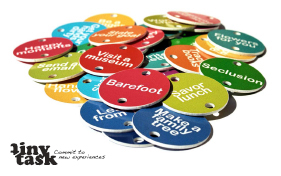TinyTask is product-service system in which an extensive collection of key chain coins is gradually distributed to users. Each coin represents a unique small (tiny) assignments that persuade users to do new things in their daily life, and thereby develop an attitude of active experimentation and reflective observation. The coin has inscriptions that give a hint on what the assignment is about, such as: ‘early bird’ or ‘improvise your meal’. The back of the coin has a marker. With this marker, the user can read the full assignment on his or her profile page on the Tinytask website. The user selects one coin to commit to, and attaches it to his or her key chain. It should stay there until the assignment has been completed. Once completed, the user can confirm this on the website, and make notes in his or her personal diary.

Tinytask examples
Every TinyTask assignment is a tiny execution of a happiness strategy, brought down to a very concrete and low threshold activity. The twelve strategies of Lyubomirsky (2007) were adapted, using the validated interventions from her experimental studies, and downscaling them to fit in people’s daily lives.
Links
http://diopd.org/projects/design-projects/tiny-tasks-by-hans-ruitenberg/
http://designinghappiness.wordpress.com
Author
Hans Ruitenberg (concept & design).
Reference
Desmet, P.M.A., & Sääksjärvi, M.C. (2016). Form Matters: Design Creativity in Positive Psychological Interventions. Psychology of Well-Being: Theory, Research and Practice, 6:7, DOI 10.1186/s13612-016-0043-5
Ruitenberg, H.P., & Desmet, P.M.A. (2012). Design thinking in positive psychology. The development of a product-service combination that stimulates happiness-enhancing activities. In: J. Brassett, P. Hekkert, G. Ludden, M. Malpass, & J., McDonnell (Eds.), Proceedings of the 8th International Design and Emotion Conference, Central Saint Martin College of Art & Design, London (UK), 11-14 September 2012.
Availability
TinyTask is available upon request.
Publication date
June 2010



